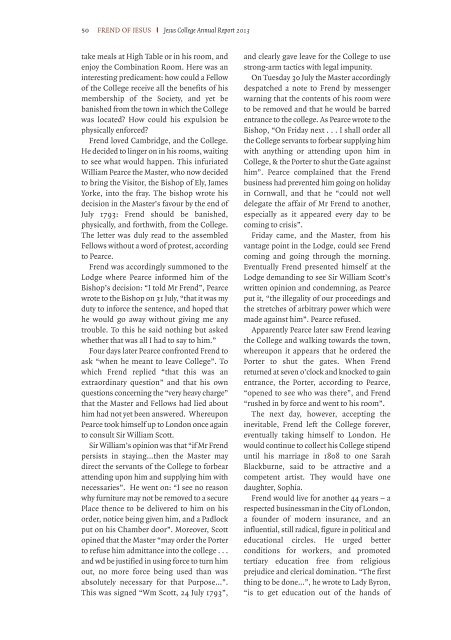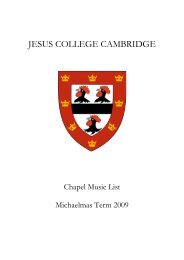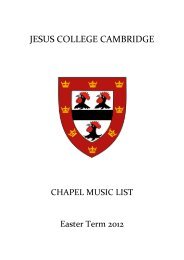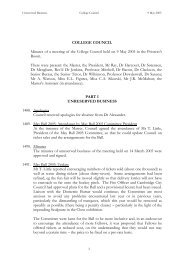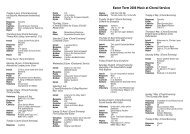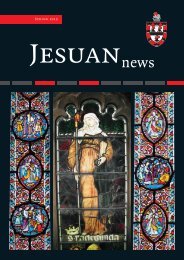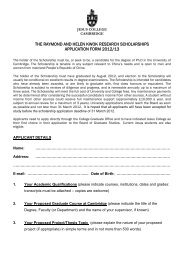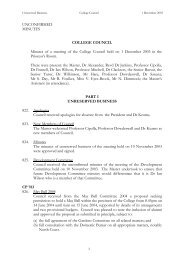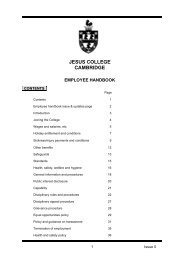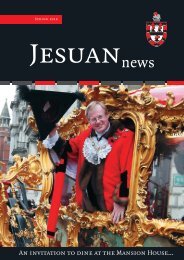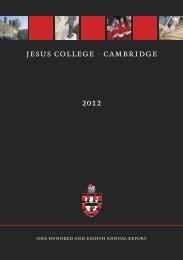2013 Annual Report - Jesus College - University of Cambridge
2013 Annual Report - Jesus College - University of Cambridge
2013 Annual Report - Jesus College - University of Cambridge
Create successful ePaper yourself
Turn your PDF publications into a flip-book with our unique Google optimized e-Paper software.
50 FREND OF JESUS I <strong>Jesus</strong> <strong>College</strong> <strong>Annual</strong> <strong>Report</strong> <strong>2013</strong><br />
take meals at High Table or in his room, and<br />
enjoy the Combination Room. Here was an<br />
interesting predicament: how could a Fellow<br />
<strong>of</strong> the <strong>College</strong> receive all the benefits <strong>of</strong> his<br />
membership <strong>of</strong> the Society, and yet be<br />
banished from the town in which the <strong>College</strong><br />
was located? How could his expulsion be<br />
physically enforced?<br />
Frend loved <strong>Cambridge</strong>, and the <strong>College</strong>.<br />
He decided to linger on in his rooms, waiting<br />
to see what would happen. This infuriated<br />
William Pearce the Master, who now decided<br />
to bring the Visitor, the Bishop <strong>of</strong> Ely, James<br />
Yorke, into the fray. The bishop wrote his<br />
decision in the Master’s favour by the end <strong>of</strong><br />
July 1793: Frend should be banished,<br />
physically, and forthwith, from the <strong>College</strong>.<br />
The letter was duly read to the assembled<br />
Fellows without a word <strong>of</strong> protest, according<br />
to Pearce.<br />
Frend was accordingly summoned to the<br />
Lodge where Pearce informed him <strong>of</strong> the<br />
Bishop’s decision: “I told Mr Frend”, Pearce<br />
wrote to the Bishop on 31 July, “that it was my<br />
duty to inforce the sentence, and hoped that<br />
he would go away without giving me any<br />
trouble. To this he said nothing but asked<br />
whether that was all I had to say to him.”<br />
Four days later Pearce confronted Frend to<br />
ask “when he meant to leave <strong>College</strong>”. To<br />
which Frend replied “that this was an<br />
extraordinary question” and that his own<br />
questions concerning the “very heavy charge”<br />
that the Master and Fellows had lied about<br />
him had not yet been answered. Whereupon<br />
Pearce took himself up to London once again<br />
to consult Sir William Scott.<br />
Sir William’s opinion was that “if Mr Frend<br />
persists in staying…then the Master may<br />
direct the servants <strong>of</strong> the <strong>College</strong> to forbear<br />
attending upon him and supplying him with<br />
necessaries”. He went on: “I see no reason<br />
why furniture may not be removed to a secure<br />
Place thence to be delivered to him on his<br />
order, notice being given him, and a Padlock<br />
put on his Chamber door”. Moreover, Scott<br />
opined that the Master “may order the Porter<br />
to refuse him admittance into the college . . .<br />
and wd be justified in using force to turn him<br />
out, no more force being used than was<br />
absolutely necessary for that Purpose…”.<br />
This was signed “Wm Scott, 24 July 1793”,<br />
and clearly gave leave for the <strong>College</strong> to use<br />
strong-arm tactics with legal impunity.<br />
On Tuesday 30 July the Master accordingly<br />
despatched a note to Frend by messenger<br />
warning that the contents <strong>of</strong> his room were<br />
to be removed and that he would be barred<br />
entrance to the college. As Pearce wrote to the<br />
Bishop, “On Friday next . . . I shall order all<br />
the <strong>College</strong> servants to forbear supplying him<br />
with anything or attending upon him in<br />
<strong>College</strong>, & the Porter to shut the Gate against<br />
him”. Pearce complained that the Frend<br />
business had prevented him going on holiday<br />
in Cornwall, and that he “could not well<br />
delegate the affair <strong>of</strong> Mr Frend to another,<br />
especially as it appeared every day to be<br />
coming to crisis”.<br />
Friday came, and the Master, from his<br />
vantage point in the Lodge, could see Frend<br />
coming and going through the morning.<br />
Eventually Frend presented himself at the<br />
Lodge demanding to see Sir William Scott’s<br />
written opinion and condemning, as Pearce<br />
put it, “the illegality <strong>of</strong> our proceedings and<br />
the stretches <strong>of</strong> arbitrary power which were<br />
made against him”. Pearce refused.<br />
Apparently Pearce later saw Frend leaving<br />
the <strong>College</strong> and walking towards the town,<br />
whereupon it appears that he ordered the<br />
Porter to shut the gates. When Frend<br />
returned at seven o’clock and knocked to gain<br />
entrance, the Porter, according to Pearce,<br />
“opened to see who was there”, and Frend<br />
“rushed in by force and went to his room”.<br />
The next day, however, accepting the<br />
inevitable, Frend left the <strong>College</strong> forever,<br />
eventually taking himself to London. He<br />
would continue to collect his <strong>College</strong> stipend<br />
until his marriage in 1808 to one Sarah<br />
Blackburne, said to be attractive and a<br />
competent artist. They would have one<br />
daughter, Sophia.<br />
Frend would live for another 44 years – a<br />
respected businessman in the City <strong>of</strong> London,<br />
a founder <strong>of</strong> modern insurance, and an<br />
influential, still radical, figure in political and<br />
educational circles. He urged better<br />
conditions for workers, and promoted<br />
tertiary education free from religious<br />
prejudice and clerical domination. “The first<br />
thing to be done…”, he wrote to Lady Byron,<br />
“is to get education out <strong>of</strong> the hands <strong>of</strong>


